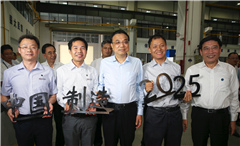Made in China 2025: Manufacturers absorb foreign tech
2017-05-22
cgtn
The "Made in China 2025" concept is a 10-year national plan designed to turn China from a manufacturing giant into a global high-tech manufacturing powerhouse. Two years after the launch, local manufacturers in Shenyang in northeast China have been absorbing foreign technologies.
For instance: the joint venture between Germany's BMW and China's Brilliance Auto Group has been the backbone of the local economy. It is Shenyang's top taxpayer, and the two partners continue to ramp up operations. A new production facility was opened this week to meet rising demand for luxury vehicles from Chinese customers.
The German automaker BMW has been expanding its operations in the fast-growing Chinese market, tripling the number of models it produces here and deepening its alliance with the local partner. The opening of the new production plant is another milestone for the company's overseas operations. But given the fact that, Liaoning is perhaps the worst performing region economically, People might have doubts about the wisdom of BMW's decision.
"It was logical to continue with our Brilliance Auto partner also with our team here to make the next step. And there are no other options but to expand. We are very happy about this decision", said Oliver Zipse, board member of BMW AG.
In 2012, Germany launched the concept of "Industry 4.0" in its manufacturing sector. Three years later, the Chinese version, "Made in China 2025," made its debut.
The BMW-Brilliance venture stands as a shining example of how the two parallel programs can fuse together. And with the help of German technology, the Chinese half of the venture has learned plenty.
The President & CEO of BMW Brilliance Auto group in Shenyang - Dr. Johann Wieland believes that both sides have to exchange technologies to achieve a win-win situation. It was the purpose of the joint venture.
The joint venture is not alone: Many local manufacturers in Shenyang are gobbling up foreign technology every chance they get. Among them is the NHI group, which is today the country's leader in tunnel boring technology. Mergers and acquisitions with foreign firms have bolstered the company's potential: a couple of years ago, only 5 percent of the components and technologies of their products were domestically produced. Today, that percentage has increased to 70 percent.
There are still obstacles in achieving sustainable development: many joint ventures in the region say rising labor costs and a shortage of qualified workers remain as the key challenges. Both sides will need to work together to address these issues.



